- Home
- Julia London
A Royal Kiss & Tell
A Royal Kiss & Tell Read online
Every prince has his secrets. And she’s determined to unravel his...
Every young man in London’s ton is vying for Lady Caroline Hawke’s hand—except one. Handsome roué Prince Leopold of Alucia can’t quite remember Caroline’s name, and the insult is not to be tolerated. So Caroline does what any clever, resourceful lady of means would do to make sure Leo never again forgets: sees that scandalous morsels about his reputation are printed in a ladies’ gossip gazette...all while secretly setting her cap for the rakish royal.
Someone has been painting Leo as a blackguard, but who? Socially, it is ruining him. More important, it jeopardizes his investigation into a contemptible scheme that reaches the highest levels of British government. Leo needs Lady Caroline’s help to regain access to society. But this charming prince is about to discover that enlisting the deceptively sweet and sexy Lady Caroline might just cost him his heart, his soul and both their reputations...
Praise for New York Times bestselling author
Julia London
“Julia London writes vibrant, emotional stories and sexy, richly drawn characters.”
—Madeline Hunter, New York Times bestselling author
“[E]nticing from the very first page!”
—Publishers Weekly on Seduced by a Scot
“Warm, witty and decidedly wicked—great entertainment.”
—Stephanie Laurens, #1 New York Times bestselling author, on Hard-Hearted Highlander
“An absorbing read from a novelist at the top of her game.”
—Kirkus Reviews, starred review, on Wild Wicked Scot
“Expert storytelling and believable characters make the romance [one that] readers will be sad to leave behind.”
—Publishers Weekly, starred review, on Wild Wicked Scot
“London is at the top of her game in this thrilling tale of political intrigue and second chances.”
—Booklist, starred review, on Wild Wicked Scot
Also available from Julia London and HQN
A Royal Wedding
The Princess Plan
The Cabot Sisters
The Trouble with Honor
The Devil Takes a Bride
The Scoundrel and the Debutante
The Highland Grooms
Wild Wicked Scot
Sinful Scottish Laird
Hard-Hearted Highlander
Devil in Tartan
Tempting the Laird
Seduced by a Scot
Julia London
A Royal Kiss & Tell
Contents
CHAPTER ONE
CHAPTER TWO
CHAPTER THREE
CHAPTER FOUR
CHAPTER FIVE
CHAPTER SIX
CHAPTER SEVEN
CHAPTER EIGHT
CHAPTER NINE
CHAPTER TEN
CHAPTER ELEVEN
CHAPTER TWELVE
CHAPTER THIRTEEN
CHAPTER FOURTEEN
CHAPTER FIFTEEN
CHAPTER SIXTEEN
CHAPTER SEVENTEEN
CHAPTER EIGHTEEN
CHAPTER NINETEEN
CHAPTER TWENTY
CHAPTER TWENTY-ONE
CHAPTER TWENTY-TWO
CHAPTER TWENTY-THREE
CHAPTER TWENTY-FOUR
CHAPTER TWENTY-FIVE
CHAPTER TWENTY-SIX
CHAPTER TWENTY-SEVEN
CHAPTER TWENTY-EIGHT
CHAPTER TWENTY-NINE
CHAPTER THIRTY
EPILOGUE
EXCERPT FROM THE EARL'S MARRIAGE BARGAIN BY LOUISE ALLEN
CHAPTER ONE
Helenamar, Alucia
1846
It is an absolute truth that men and women alike desire the earnest vow of someone to love and cherish them all their days, and that nothing elicits joy in the breast of all mankind quite like a wedding.
Recently, the most joyous occasion was the wedding of the universally admired Lady Eliza Tricklebank and His Royal Highness Sebastian Charles Iver Chartier, the Crown Prince of Alucia.
The bride entered Saint Paul’s Cathedral in the Alucian capital city of Helenamar at half past twelve. She wore a gown of white silk and chiffon. It was fashioned in the Alucian style, cut close to the body and featuring a customary train thirty feet in length. The train was hand stitched in silver and gold thread with the symbols of Alucia and England, including the famous Alucian racehorses, the mountain buttercup and the Chartier coat of arms. England was duly represented in the Tudor rose, the lion and the English royal banner. The Alucian national motto, Libertatem et Honorem, was embroidered in tiny scalloped letters around the hems of the sleeves.
The bride wore a veil anchored with a diamond tiara with a center stone weighing ten carats, lent to her by Her Majesty Queen Daria. Around her neck she wore a pearl necklace comprising twenty-three pearls, one for each of the provinces in Alucia, a gift from His Majesty King Karl. On her breast Lady Tricklebank wore a sapphire-and-gold brooch, a wedding gift from her fiancé, Prince Sebastian.
The prince was dressed in a black frock of superfine wool, worn to midcalf, a white waistcoat embroidered in miniature with the same symbols of Alucia and England as the bride’s train, and a silk cravat trimmed in silver and gold thread. He wore the crown bestowed on him at his investiture as crown prince.
After the ceremony, the newlyweds rode in open carriage to Constantine Palace through a throng of well-wishers that lined the avenue for three miles.
The king granted the prince and his new bride the titles of Duke and Duchess of Tannymeade. They will reside in the port city at Tannymeade Palace.
—Honeycutt’s Gazette of Fashion and
Domesticity for Ladies
THE PROMISE INHERENT in any wedding was delightful, but if it were a royal wedding, the paroxysms of joy might very well result in smiles permanently frozen to all the cheerful faces. It would turn the most jaded heart to gold. And if the beatific royal bride were one’s dearest friend, it would provoke cascading waves of unbridled happiness.
Lady Caroline Hawke was over the moon at the good fortune of her dearest friend, Eliza Tricklebank, who was, at that very moment, swearing her love and fealty to Prince Sebastian. Until a scant few months ago, Eliza had been determined to be a spinster and care for her blind father for the rest of his days. She spent her days in plain gowns and aprons, alternately reading to her father or engaging in her curious hobby of repairing clocks. But then Eliza was invited to a royal ball, and a man was murdered, and she was given some gossip that pointed to the identity of the killer, and the next thing Caroline knew, her Eliza was marrying a man who would one day be king of this country. Which meant Eliza would be queen.
It was so improbable, so impossible, that it went well beyond even the wildest fairy tale Caroline had ever heard or had the capacity to imagine.
Seated in the front row of the cathedral, a place of honor awarded to her as Eliza’s dearest friend, Caroline was a little misty about it. Eliza radiated happiness. Caroline had never considered herself the sentimental type, but here she was.
She shifted her gaze to Prince Leopold, standing beside his brother, Prince Sebastian. She wondered what he thought of the occasion and the happy couple. He was quite tall and had a robust and muscular figure. The broad shoulders of his coat tapered to a slim waist, then flared out again. He looked so regal and masculine that Caroline allowed herself a bit of a daydream—she imagined walking down this very aisle on his arm.
She refused to ruin this pleasant little dream by recalli
ng his wretched reception of her at the royal banquet. At that august event, he’d looked at her as if she were a servant come to take away his soiled clothing. He’d done it again during a morning ride through Klevauten Park that had been arranged for the wedding guests. On that day, when she’d galloped up beside him and his friends, he’d frowned and said, “You must be lost, madam.” As if she were some ragamuffin who had slipped into a royal party!
Fortunately for him, Caroline had a forgiving nature and, in spite of her pique, could still imagine what it would be like if Prince Leopold were to smile at her the way Prince Sebastian smiled at Eliza. What joy it would be to walk down the aisle with him while wearing a gown as beautiful as Eliza’s, which, naturally, Caroline had helped the royal dressmakers to design. She had a keen eye for fashion.
Next to Eliza stood her sister, Mrs. Hollis Honeycutt, the matron of honor. Hollis had the help of eight little cherubs to oversee the elaborate train affixed to Eliza’s wedding dress. The cherubs were dressed identically to Eliza, without the train, of course, because only the most seasoned of ladies could maneuver in them. Instead, the girls wore flower crowns on their heads. There were no bridesmaids.
If it were Caroline’s wedding, she would have had a fleet of bridesmaids.
But in Alucia, Eliza explained, that was not the custom. “Flower girls,” she’d said. “They come from all over the country. It’s quite an honor to be named a flower girl, as I understand it.”
“But why can’t you have what you like?” Caroline complained, assuming, of course, that Eliza liked what she liked. Since the day of Eliza’s betrothal to Prince Sebastian, Caroline had also assumed, quite incorrectly, that she would be the principal bridesmaid. After all, she and Eliza and Hollis had been entwined in one another’s lives since they were very little girls.
“I am content with flower girls, honestly,” Eliza said. “I’d be content with a very simple affair. I was content with the civil ceremony. But Queen Daria prefers otherwise.”
“Naturally, she does. This is the wedding where you will be seen by all the people you will rule one day.”
Eliza snorted. “I will not rule, Caroline. I’ll be fortunate if I can find my husband in this massive place.” She’d gestured to the decorative walls around them. It was not an exaggeration—Constantine Palace appeared to be bigger than even Buckingham.
“Let me be the maid of honor,” Caroline had begged her. “I am much better equipped to see to your train than Hollis is.”
“I beg your pardon! I am her sister,” Hollis reminded Caroline.
“The train is thirty feet, Hollis. How will you ever manage? You’ve scarcely managed your own train since we’ve been in Alucia. And my gown should be seen. I spared no expense for it.”
Eliza and Hollis looked at Caroline.
“I mean, of course, after your gown is seen.”
The sisters continued to stare at her.
Caroline shrugged a very tiny bit. “Obviously,” she added.
“I rather thought that’s what you meant,” Eliza said charitably.
The three of them had gleefully adopted the Alucian style of dress since arriving a month ago in Helenamar. The English style of dress—full skirts, high necks and long sleeves—was hot and heavy. They’d admired the beautiful Alucian gowns that fit the curves of a woman’s body, with the long flowing sleeves, and, most of all, the elaborately embroidered trains...until they discovered that the unusually long trains were a bit of a bother to wear.
“I will manage,” Hollis had insisted. “No one has come to this wedding to see your gown, Caro.”
“Well, obviously, Hollis, they haven’t. But they will be delighted all the same, won’t they? And by the bye, there’s no law that says the attendant of honor must be one’s sister.”
“There is no law, but she is my sister and she will be the attendant of honor,” Eliza said. “And besides, if you were to stand with me, I’d fret the entire ceremony that you were too enthralled with Leo to even notice my train.” She’d arched a golden brow directly at Caroline.
As if Caroline had done something wrong.
She most certainly had not. “Leo? Is that what we’re calling him now?” she drawled. Leo was Prince Sebastian’s younger brother. His Royal Highness Prince Leopold.
Prince Leopold, as everyone knew, had spent the last several years in England, “attending” Cambridge, which meant, in reality, that he spent more time at soirees and gentlemen’s clubs and hunting lodges than studying. Caroline had encountered him last summer in Chichester at a country house party. They’d engaged in a charming little exchange that Caroline recalled perfectly, word for word. Prince Leopold, on the other hand, remembered it not at all. Worse, he didn’t seem to remember her.
The archbishop’s voice suddenly rose into a chant of some sort, drawing Caroline’s attention back to the ceremony. Oh dear, she was thinking about Prince Leopold again when she should be watching her best friend marry a prince. At that moment, Eliza slipped her hand into Prince Sebastian’s hand and held on tightly as the archbishop asked her to repeat after him in English. To love, to honor, to protect and defend.
So romantic.
Caroline glanced to her right. She was seated next to her brother, the baron Beckett Hawke. He was older than her by half a dozen years and had been her guardian since she was eight and he was fourteen. She leaned against him. “Isn’t she lovely?” she whispered.
“Ssh.”
“I think she is lovelier than even Queen Victoria on her wedding day,” Caroline whispered. “Her gown is beautiful. It was my idea to use the gold and silver thread on the train.”
Beck pretended not to have heard a word.
“Do you know, I think I could have made that train.”
Her brother put his hand on Caroline’s knee and squeezed as he turned his pale green eyes to hers. He frowned darkly.
Caroline pushed his hand away and glanced around her. It was massive, this Saint Paul’s Cathedral. Painted ceilings soared overhead with visions of angels and other godly images. All the fixtures were gold plated, particularly the pulpit, which looked more like a monument than a stand for the Bible. There was so much stained glass that the morning light fractured across Eliza’s long train, turning it into a moving rainbow as sunlight shimmered through the panes.
Every seat in the massive cathedral was taken, filled with beautiful people of varying skin tones and colorful costumes and glittering jewels. They had come far and wide, Caroline understood, from countries she’d never even heard of.
In a cove above the altar, a choir of young men and boys sang the hymns that had accompanied Eliza down the center aisle to meet her prince. It had sounded as if the heavens had parted and the angels were singing for this bride.
The ceremony, almost an hour of it now, was filled with a lot of pomp and circumstance. Caroline wasn’t entirely certain what was happening, as the ceremony was conducted in Latin and Alucian and, for the parts Eliza had to say, in English. It seemed to her that Eliza and Sebastian were up and down quite a lot, one minute on their knees with their heads bowed, and standing the next, staring starry-eyed at each other. There was a somber moment when Eliza was directed down onto her knees alone. It looked as if she were knighted or anointed in some way, and when it was done, the archbishop put his hand to her head, the king and queen stood, and then Prince Sebastian lifted her up and pinned a gorgeous sapphire-and-gold brooch to her breast.
“She’s a real princess now,” Caroline whispered to Beck.
Predictably, he ignored her.
Eliza looked like a princess, too, and Caroline wished Eliza’s father, Justice Tricklebank, could be here. Alas, his advanced age and blindness had made it impossible for him to attend. There had been a smaller, private ceremony in England—the first civil union—before Sebastian had returned to Alucia. That ceremony, which her father had attended, ha
d been necessitated by the fact that Eliza and Sebastian could not seem to keep their hands from each other for as much as a few hours.
There was another civil union once Eliza had arrived in Alucia so there would be no question of impropriety, as the heat between Eliza and her prince had only grown. It was embarrassing, really.
But neither ceremony had been anything like this. This was a pageant, a feast for the eyes and hearts of romantics everywhere.
Caroline’s mind drifted, and she wondered if all these people would be at the ball tonight. She hoped so. She had a beautiful blue Alucian gown trimmed in gold that was astoundingly beautiful. She’d made the train herself. The ball would be her moment to shine...next to Eliza, of course.
Yesterday, Eliza had nervously counted out the heads of state that would attend the wedding and the ball and had turned a bit pale as the number mounted. Caroline’s pulse had leapt with delight.
“I can’t bear it!” Eliza had exclaimed, unnerved by the number of dignitaries, of the many kings and queens. “What if I say something wrong? You know how I am. Have you any idea how many gifts we’ve received? Am I to remember them all? I’ve never seen so many gold chalices and silver platters and fine porcelain in all my life! What if I trip? What if I spill something on my gown?”
“My advice, darling, is not to fill your plate to overflowing,” Hollis had said absently. She was bent over her paper, making notes for the periodical she published, the Honeycutt’s Gazette of Fashion and Domesticity for Ladies. The twice-monthly gazette covered such topics as the latest fashions, domesticity and health advice, and—the most interesting part—the most tantalizing on-dits swirling about London’s high society.
Hollis could hardly keep up with the ravenous demand for society news now. She was planning to publish a gazette that would be twice the length of her normal offering with all the news of the royal wedding the moment she returned to London. She’d been busily dispatching letters to her manservant, Donovan, for safekeeping throughout the month they’d been in Alucia.

 A Royal Kiss & Tell
A Royal Kiss & Tell You Lucky Dog
You Lucky Dog The Devil in the Saddle
The Devil in the Saddle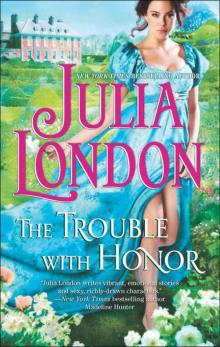 The Trouble with Honor
The Trouble with Honor Tempting the Laird
Tempting the Laird The Secret Lover
The Secret Lover A Light at Winter’s End
A Light at Winter’s End The Charmer in Chaps
The Charmer in Chaps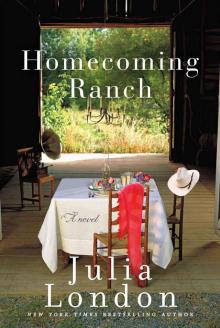 Homecoming Ranch
Homecoming Ranch Jack (7 Brides for 7 Soldiers Book 5)
Jack (7 Brides for 7 Soldiers Book 5) A Courtesan's Scandal
A Courtesan's Scandal Hard-Hearted Highlander--A Historical Romance Novel
Hard-Hearted Highlander--A Historical Romance Novel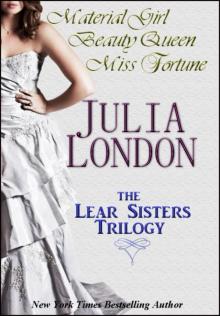 The Complete Novels of the Lear Sister Trilogy
The Complete Novels of the Lear Sister Trilogy The Last Debutante
The Last Debutante Suddenly Single (A Lake Haven Novel Book 4)
Suddenly Single (A Lake Haven Novel Book 4) Seduced by a Scot
Seduced by a Scot Highlander Unbound
Highlander Unbound Suddenly Dating (A Lake Haven Novel Book 2)
Suddenly Dating (A Lake Haven Novel Book 2) The Bridesmaid
The Bridesmaid The Seduction of Lady X
The Seduction of Lady X One Mad Night
One Mad Night Extreme Bachelor
Extreme Bachelor The Scoundrel and the Debutante
The Scoundrel and the Debutante The Revenge of Lord Eberlin
The Revenge of Lord Eberlin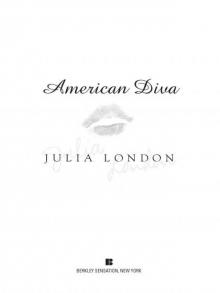 American Diva
American Diva The Lovers: A Ghost Story
The Lovers: A Ghost Story The Hazards of Hunting a Duke
The Hazards of Hunting a Duke Return to Homecoming Ranch (Pine River)
Return to Homecoming Ranch (Pine River)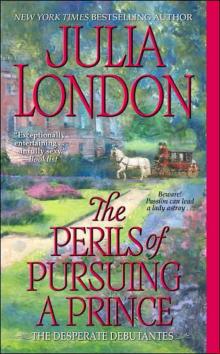 The Perils of Pursuing a Prince
The Perils of Pursuing a Prince Highlander in Love
Highlander in Love The Devil Takes a Bride
The Devil Takes a Bride Devil in Tartan
Devil in Tartan Wild Wicked Scot
Wild Wicked Scot Snowy Night with a Highlander
Snowy Night with a Highlander One Season of Sunshine
One Season of Sunshine Summer of Two Wishes
Summer of Two Wishes All I Need Is You aka Wedding Survivor
All I Need Is You aka Wedding Survivor Sinful Scottish Laird--A Historical Romance Novel
Sinful Scottish Laird--A Historical Romance Novel Suddenly Engaged (A Lake Haven Novel Book 3)
Suddenly Engaged (A Lake Haven Novel Book 3) Highlander in Disguise
Highlander in Disguise Suddenly in Love (Lake Haven#1)
Suddenly in Love (Lake Haven#1)